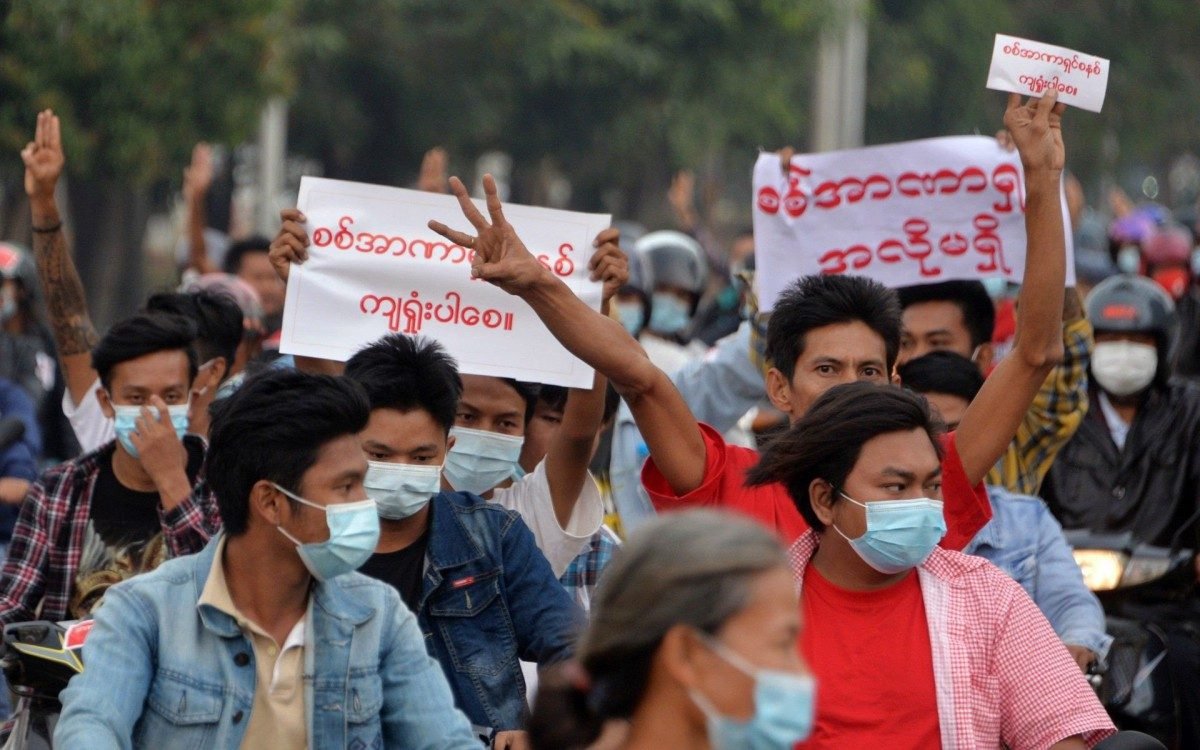By AFP
Posted 02/05/2021 11:25 AM
Thousands of people protested on Sunday (2) in several regions of Myanmar and some activists called for a “revolutionary spring”, three months after the military council’s coup against the civilian government.
Since February, despite violent repression by the military council, demonstrations have erupted across the country: a major campaign of civil disobedience, with thousands of workers striking, and paralyzing entire sectors of the economy. Meanwhile, the opposition, now in hiding, formed a resistance government.
The Karen National Union, one of the main rebel groups in eastern Myanmar, on Sunday called on other ethnic minorities in the region to unite against “military dictatorship”.
Several demonstrations took place on Sunday in Yangon. In one, extremist activists called for a “revolutionary spring”, after a rapid march and dispersal, to avoid clashes with the security forces.
They chanted, “Our path leads us to democracy,” displaying three fingers on one hand, a symbol of resistance.
“Our road leads to the fall of the military dictatorship,” was another phrase at the demonstration.
Hundreds of people protested in the Mandalay region (center) led by monks raising the flag of the National League for Democracy, the party of former ruling Aung San Suu Kyi.
The 1991 Nobel Peace Prize winner, 75, who is in good health but has lost a lot of weight, according to lawyers, has not been seen in public since her house arrest on February 1, the day of the coup.
And in Shan State (northeast), security forces attacked protesters in Hasibao locality, and one person died after being shot in the head, according to witnesses.
Nearly 760 civilians, including minors and women, have been shot dead by security forces in the past three months, and there are 3,500 in detention, according to the non-governmental organization Aid to Political Prisoners (AAPP).
The council, which claims the League is an illegal organization, released 258 demonstrators, in addition to 17 police officers and seven military personnel.
A call to unite the rebels
Cities like Yangon are the epicenter of the revolution. Some residents posted videos showing civilians being beaten by security forces in the streets.
Home operations and night procedures are also frequent. Police use informants who provide names of people accused of aiding protesters.
The official Mirror Daily newspaper reported that a woman accused of supporting the “parallel” government was sentenced by a military court to seven years in prison for forced labor.
The woman was arrested in North Dagon district of Yangon, currently under martial law, during an operation at her home. The police have already searched their Facebook and Telegram accounts.
At various points on the borders in the northern and eastern regions, the rebellion sparked the advance of many ethnic minority rebellions facing the army. Some areas controlled by the rebel groups are home to opponents who fled the military council’s crackdown.
In the east of the country, clashes between the army and the Karen National Union, one of the main rebel minorities, have left more than 30,000 people displaced, according to the United Nations.
The Karen National Union launched an appeal on Sunday to demand the unification of ethnic groups in the region against the military.
In a letter addressed to other rebel groups in the Karen state, Lt. Gen. Bao Kyaw Hee says that they have not spoken publicly since the coup.
Myanmar has more than 20 ethnic rebel groups, including many that control areas in the country’s border areas.

“Hardcore beer fanatic. Falls down a lot. Professional coffee fan. Music ninja.”






More Stories
The law allows children and adolescents to visit parents in the hospital.
Scientists pave the way for the emergence of a new element in the periodic table | World and Science
Can dengue cause hair loss? Expert explains how the disease affects hair